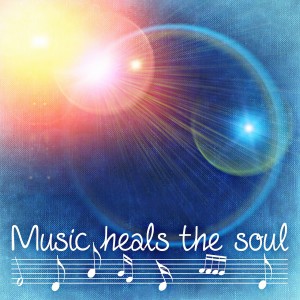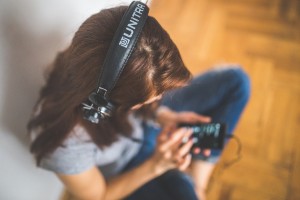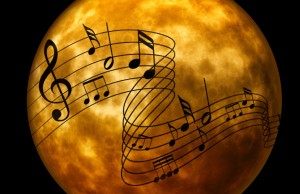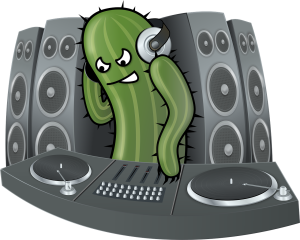The healing powers of music is what led me into recording the “Prophetic Musical Journey.” As I’ve discussed in other posts, it’s obvious that music affects people, both negatively and positively. Not that I pay attention to everything in the news but it seemed odd to me that when reading about many of the mass murders in schools, the “perps” listened to some very interesting music right before they committed their heinous crimes. The music usually involved lyrics about killing and death. It’s almost like this music inspired them. So, what’s up with that?
 On the other end of the spectrum, there’s a lot of people who are having some great results by listening to music that’s meant for the purposes of healing. More and more of this music is available on the market today. Google “healing music” and you’ll find a variety of artists composing and performing music specifically for the purposes of healing.
On the other end of the spectrum, there’s a lot of people who are having some great results by listening to music that’s meant for the purposes of healing. More and more of this music is available on the market today. Google “healing music” and you’ll find a variety of artists composing and performing music specifically for the purposes of healing.
Having been a musician most of my life, I know how music affects me. There are days I really enjoy listening to a nice happy-go-lucky piece of music and other days, I need to listen to something more reflective. I’ve also found it interesting that many musicians struggle with listening to their own performances. Maybe it’s because we are taught to be critical (hopefully in a good way) so we can improve upon each performance. We always hear the mistakes and cringe.
Composers on the other hand, have the opportunity to change what they don’t like. And, if they don’t like what they write, there’s the round file in the corner for those scores. There’s also music that’s improvisational in nature. In that case, you get one shot at it and what you’ve done is recorded into history. I remember my days in jazz band as lead tenor sax where solos abounded but I never wanted to play them, so I gave them away to eager trombone and trumpet players. Jazz and me… eh… not so much.
 I wrote a blog post about musical intent which you might find interesting. In a sense, I believe it’s more about intent than it is about the notes, concert pitch, or temperament used to create a song or instrumental piece. The intent in a song is obvious because the words create the intent. A quick listen and study of the lyrics is what will provide that intent.
I wrote a blog post about musical intent which you might find interesting. In a sense, I believe it’s more about intent than it is about the notes, concert pitch, or temperament used to create a song or instrumental piece. The intent in a song is obvious because the words create the intent. A quick listen and study of the lyrics is what will provide that intent.
Experiment!!!
Now, I’ve known of musicians, as an example, who have taken a song and re-recorded it with a different intent in mind. In a way, it’s as much about the artist creating a new version as it is about the original song. Here’s a little experiment… listen to the same song by several artists. After going through this process, feel free to report back here with your answers:
- Listen to the original first and write down your thoughts. Make sure you find the original recording artist if at all possible. Choose a song with words simply because it’s easier to determine the intent.
- Analyze the lyrics to see if you can determine the intent of the original artist and/or lyricist.
- Pick at least two or three additional versions of the same song.
- Write down how each version changes. This includes tempo, instruments, chords (if you can tell), and style of the music.
- Then, write your thoughts about how each affects you. What did you like and what didn’t you like about each version?
- Did the new artist change any of the words? How does each artist present the words to the song?
- Which version do you prefer and why?
- Could you sense or feel a change in the intent of each version? If so, list your thoughts.
Frequency Alignment
I believe frequency alignment is the intent of people who use specific frequencies that are meant for healing purposes. Many of these frequencies, such as 528 Hz, help bring DNA back into alignment. Although I didn’t record with the 528 initially, I did record two albums using the A=444 concert pitch. One of those is the 528 Creative DNA album. So far, it’s my one and only album where I play the clarinet. The other album is Deep Calls to Deep.
 Frequencies that bring us back into natural alignment in a sense “entrain” our bodies to a stronger frequency. This is one of the main reasons I chose to record at the A=432 concert pitch. There is scientific evidence that indicates music recorded at this concert pitch is helpful for our body, mind, emotions, and spirit. So, by using myself as an example, my intent is that my music will bring healing to people, emotionally, spiritually, and physically.
Frequencies that bring us back into natural alignment in a sense “entrain” our bodies to a stronger frequency. This is one of the main reasons I chose to record at the A=432 concert pitch. There is scientific evidence that indicates music recorded at this concert pitch is helpful for our body, mind, emotions, and spirit. So, by using myself as an example, my intent is that my music will bring healing to people, emotionally, spiritually, and physically.
Conclusion
Because music is so powerful on our emotions, if you want something in your life to change, it might be worth your while to consider what you listen to. If you listen to songs about death and destruction, those are the frequencies of intent that you’re putting into you. As I said above, many serial killers listened to some pretty gory music before they went out to complete their heinous acts.
 Maybe it’s just me but when you listen to many rap artists, there seems to be a lot of lyrics about rape, too many “F” bombs, racist directives, degrading of women, etc. I only know this because I used to be a housemother at a sorority. When the weather was nice, fraternity boys would bring out their large sound systems and broadcast this stuff for all of Greek row to hear. One selection usually had enough “F” bombs to last a life time. The intent of this stuff (that I won’t even call music) was obvious. There probably is some decent rap music with good lyrics but I’ve never heard any of it. College students seem to prefer the gross stuff.
Maybe it’s just me but when you listen to many rap artists, there seems to be a lot of lyrics about rape, too many “F” bombs, racist directives, degrading of women, etc. I only know this because I used to be a housemother at a sorority. When the weather was nice, fraternity boys would bring out their large sound systems and broadcast this stuff for all of Greek row to hear. One selection usually had enough “F” bombs to last a life time. The intent of this stuff (that I won’t even call music) was obvious. There probably is some decent rap music with good lyrics but I’ve never heard any of it. College students seem to prefer the gross stuff.
I wonder – what if artists began changing lyrics to be more positive and uplifting? Would this change our society? I suspect there would be less killing, rape, abuse, and racism because the words coming from uplifting music would “frame” our world around us to a more positive image. The same would be true for television and movies. That is a subject for another blog post…
© 2016 by Del Hungerford
[mailerlite_form form_id=2]

